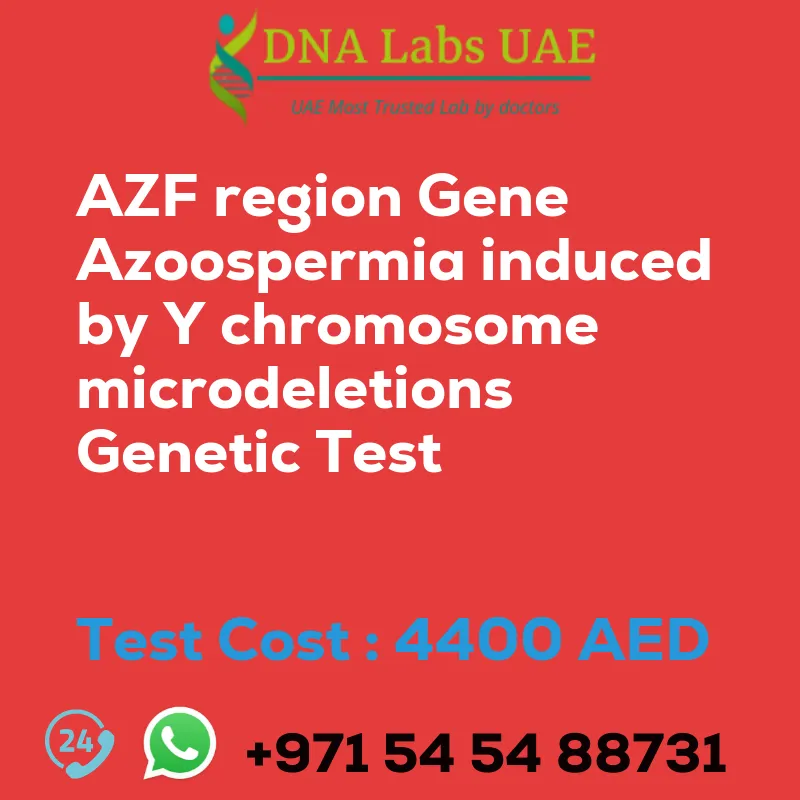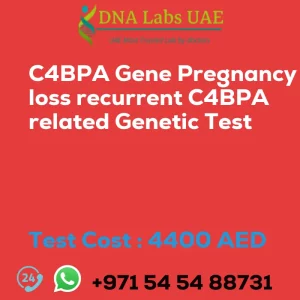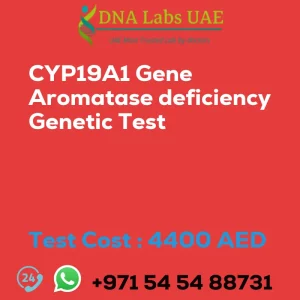AZF region Gene Azoospermia induced by Y chromosome microdeletions Genetic Test
Are you struggling with male infertility? Do you want to understand the genetic basis of azoospermia? Look no further than DNA Labs UAE, where we offer the AZF region Gene Azoospermia induced by Y chromosome microdeletions Genetic Test.
Test Components and Price
The AZF region Gene Azoospermia induced by Y chromosome microdeletions Genetic Test is available for the price of AED 4400.0. The test requires a blood sample, extracted DNA, or one drop of blood on an FTA Card.
Report Delivery and Method
After conducting the test, the report will be delivered to you within 3 to 4 weeks. The test utilizes Next-Generation Sequencing (NGS) technology to analyze the DNA sequence of the AZF region.
Test Type and Doctor
The AZF region Gene Azoospermia induced by Y chromosome microdeletions Genetic Test falls under the category of Reproductive Disorders. It is recommended to consult a Gynecologist for this test.
Test Department and Pre-Test Information
This test is conducted by our Genetics department. Before undergoing the AZF region Gene Azoospermia induced by Y chromosome microdeletions Genetic Test, it is essential to provide the clinical history of the patient. Additionally, a Genetic Counselling session will be conducted to draw a pedigree chart of family members affected by AZF region Gene Azoospermia induced by Y chromosome microdeletions.
Test Details
The AZF region Gene Azoospermia induced by Y chromosome microdeletions Genetic Test focuses on examining the AZF (Azoospermia Factor) region of the Y chromosome for microdeletions. Azoospermia is a condition characterized by the absence of sperm in the semen. Y chromosome microdeletions in the AZF region are known genetic causes of azoospermia.
Using Next-Generation Sequencing (NGS) technology, this test analyzes the DNA sequence of the AZF region to identify any microdeletions or abnormalities. This helps diagnose the genetic cause of azoospermia and provides valuable information for genetic counseling and family planning.
By identifying specific microdeletions in the AZF region, this test helps determine the prognosis and potential treatment options for individuals with azoospermia induced by Y chromosome microdeletions. It is particularly useful for couples seeking to understand the genetic basis of male infertility and make informed decisions regarding assisted reproductive techniques or other fertility treatments.
| Test Name | AZF region Gene Azoospermia induced by Y chromosome microdeletions Genetic Test |
|---|---|
| Components | |
| Price | 4400.0 AED |
| Sample Condition | Blood or Extracted DNA or One drop Blood on FTA Card |
| Report Delivery | 3 to 4 Weeks |
| Method | NGS Technology |
| Test type | Reproductive Disorders |
| Doctor | Gynecology |
| Test Department: | Genetics |
| Pre Test Information | Clinical History of Patient who is going for AZF region Gene Azoospermia induced by Y chromosome microdeletions NGS Genetic DNA Test. A Genetic Counselling session to draw a pedigree chart of family members affected with AZF region Gene Azoospermia induced by Y chromosome microdeletions NGS Genetic DNA Test gene AZF region |
| Test Details |
AZF region Gene Azoospermia induced by Y chromosome microdeletions NGS Genetic Test is a genetic test that examines the AZF (Azoospermia Factor) region of the Y chromosome for microdeletions. Azoospermia is a condition characterized by the absence of sperm in the semen. Y chromosome microdeletions in the AZF region are one of the known genetic causes of azoospermia. The test utilizes Next-Generation Sequencing (NGS) technology to analyze the DNA sequence of the AZF region and identify any microdeletions or abnormalities. This can help diagnose the genetic cause of azoospermia in individuals and provide valuable information for genetic counseling and family planning. By identifying specific microdeletions in the AZF region, this test can help determine the prognosis and potential treatment options for individuals with azoospermia induced by Y chromosome microdeletions. It is particularly useful for couples seeking to understand the genetic basis of male infertility and make informed decisions regarding assisted reproductive techniques or other fertility treatments. |








